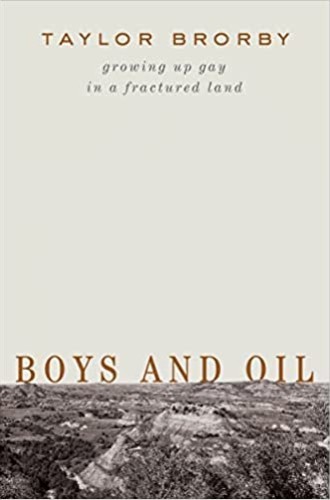A queer boy in North Dakota
Taylor Brorby’s coming-of-age memoir is a work of defiance. But it is not a tragedy.
When something is taken from its place, there is a void that must be filled; there is a reckoning in realignment. This is true with everything from fossil fuels that are extracted from the prairie to a young boy, gay and artistic, who is uprooted in search of understanding and community. Essayist and environmentalist Taylor Brorby explores both in this bold and sometimes blunt coming-of-age memoir.
Brorby struggled to find his place in the wide open spaces of North Dakota and to reconcile the wildly disparate notions of family, community, intellect, spirit, land, and self that bolster and burden him. Throughout the book he navigates the paradox, challenge, and tension of coming out, parental rejection, finding his voice, and seeking some semblance of balance (if not normality) as an openly gay man. It is not until the end, as his environmental activism is paired with his deep desire to return home and find some sense of balance, that something like resolution comes. There is almost hope—and that, perhaps, is the point.
Read our latest issue or browse back issues.
Brorby’s prose is strong, and his book is at times devastating. The little queer boy twirling in an apron, buying and stashing away a Speedo, and codependently grappling with a male college friend—all this is presented almost without sympathy, and certainly without apology. Even when Brorby recounts suicidal ideation, it comes from a place of fact and resignation, not to garner the support of his audience. He is separated from his land, his place, and his people because he is different—not simply because he is queer, but because he is always an outsider who is queer.
As for so many other queer millennials, the specter of Matthew Shephard (whom Brorby in his characteristic bluntness refers to as a scarecrow) and the threat of violence, ostracism, and harm loom over Brorby’s life. For every summer fling there is also a townie to menacingly follow him. For every unguarded moment of truly being who he is there is a sucker punch on the street. The very act of writing this memoir is an act of defiance, an invitation for consequences that come from a deeper understanding of self and place. And yet, this memoir is not a tragedy, as Brorby survives through the end (at times in spite of himself); neither is it a comedy in the traditional sense of the word, where there is happiness and resolution. It is the saga behind a snapshot; it is the story of what is uprooted in the immediate moment. Long roots extend from a complex and meaningful history.
In the middle of the book, there is a sudden turn as Brorby finds community and calling in the communion of the saints of the Evangelical Lutheran Church in America. For a few chapters, the reader follows the author’s religious awakening as he discerns the ministry, begins studies at Princeton Theological Seminary, and goes home soon after, seeking pedagogy rather than the pastorate. The episode of religiosity stands alone, not as an avowal or avoidance of spirituality but as one more example of the harrowing effects of uprootedness and displacement—of navigating, as the author names it, exile.
The broken relationship between the author and his parents is heartrending. It is easy to forget, in a world of ever-widening queer acceptance, that even with prolific media representation (Brorby used to watch Will and Grace and Queer Eye, albeit alone) there is still stigma and separation. As with the other relationships in his life, Brorby names the dynamic and lets the action (or inaction) of his father and mother speak for itself. He has the chance to prove his loyalty and worth to his family (or rather, to himself) as he cares for his grandfather at the end of his life. The tensions of acceptance and rejection, of self-knowledge and self-sacrifice, come to a head in these final chapters.
It is in the healing of the earth that Brorby finds healing for himself as well. He hears and accepts his calling—to the academy and to advocacy—and through the last pages there is a balance that comes from finding purpose and living life authentically. It is not a resolution in the traditional sense, but rather another way that things are simply what they are in this memoir, rather than what they might be. He writes toward the end, “There is, in my life, no happy, satisfying ending. . . . I no longer feel ashamed for the person I am.”
In its starkness, this memoir presents a life in the way one might find a cross section of a plant in a nature center: here is a specimen that is native to the prairie, from its blossom all the way down to its roots. There is no optimism in the presentation of what is, nor is there an unreliable narrator with an immediate agenda. Perhaps that is why the reader gets the sense of hope at the book’s end—there is no definitive conclusion, so there is yet a grain of hope.






